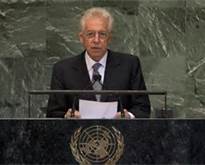Corruption in Italy
 Italy is a popular destination for tourists and those seeking connection with their Italian roots. (I confess—I married a beautiful and wonderful woman from Sicily, so I am a little biased). Europeans love to travel to Italy during their lengthy vacations. Americans look for family connections while touring Italy – everyone has Italian relatives in some village.
Italy is a popular destination for tourists and those seeking connection with their Italian roots. (I confess—I married a beautiful and wonderful woman from Sicily, so I am a little biased). Europeans love to travel to Italy during their lengthy vacations. Americans look for family connections while touring Italy – everyone has Italian relatives in some village.
When it comes to Italian politics, people avoid trying to understand the complexities of politicians and political parties. This same attitude is applied to corruption in Italy. While there is a rich history of corruption in the political world and in society, the issue is a lot more complex than knee-jerk characterizations.
Transparency International’s 2012 Corruption Perception Index ranked Italy 72nd out of 176 countries. Italy’s ranking has declined in the last three years (from 63rd in 2009 to 69th in 2011). Corruption costs the Italian economy around 60 billion euro a year.
During the Berlusconi era (1994 to 1995, 2001 to 2006 and 2008 to 2011), corruption permeated Italy’s political system, at both the national and local level. His conviction in October 2012 to four years in prison for tax evasion was the culmination of years of scandal, derailed prosecutions and charges of judicial manipulation by Berlusconi and his cronies. Even with Berlusconi gone from the scene and trying to regain power, scandals continue at regional governments tied to political funding.
Mario Monti was not the most popular politician in Italy. His austerity program caused economic pain throughout the economy. Despite his poor economic performance, Monti was able to push through a new anti-corruption law. Italy is one of the most aggressive enforcers of anti-corruption laws. Italy’s new law added a number of crimes to the penal code such as “influence peddling,” protected whistleblowers and increased accountability of public organizations by requiring them to implement anti-corruption laws. In addition, the law increased punishment for public officials convicted of bribery.
officials convicted of bribery.
In addition to aggressive domestic enforcement of corruption laws, Italy is recognized for its enforcement of its foreign bribery laws. The OECD’s Phase 3 report on Italy found that Italy has devoted “significant efforts” to investigate and prosecute foreign bribery.
The OECD cited Italy’s positive prosecution commitment but noted that prosecutors are hindered by an inflexible statute of limitations which bars prosecutions after 7.5 years for all stages of a trial including appeals.
 Italy has a comprehensive foreign bribery framework for prosecuting bribery and a variety of sanctions against companies and individuals. Many countries are legally limited to prosecuting individuals and do not have a law on the books to charge corporations with foreign bribery offenses. In contrast, Italy has a broad foreign bribery law which applies to companies. As a result, a large number of Italian companies have put in place comprehensive anti-corruption compliance programs and internal controls.
Italy has a comprehensive foreign bribery framework for prosecuting bribery and a variety of sanctions against companies and individuals. Many countries are legally limited to prosecuting individuals and do not have a law on the books to charge corporations with foreign bribery offenses. In contrast, Italy has a broad foreign bribery law which applies to companies. As a result, a large number of Italian companies have put in place comprehensive anti-corruption compliance programs and internal controls.















